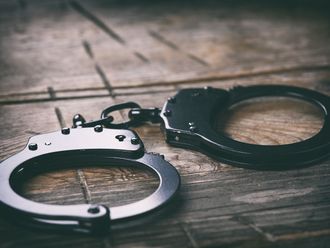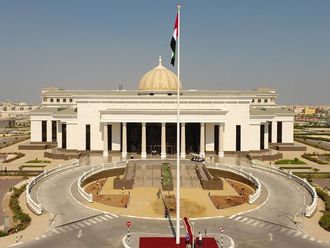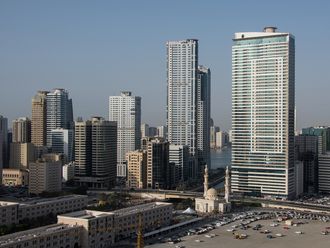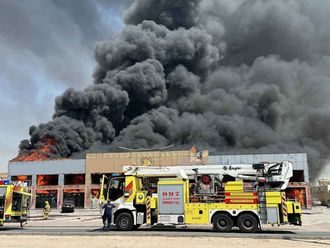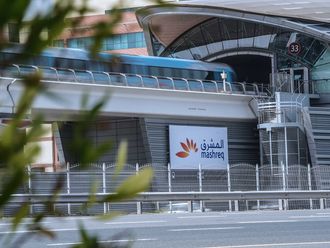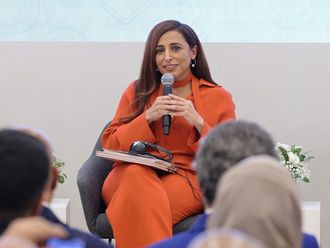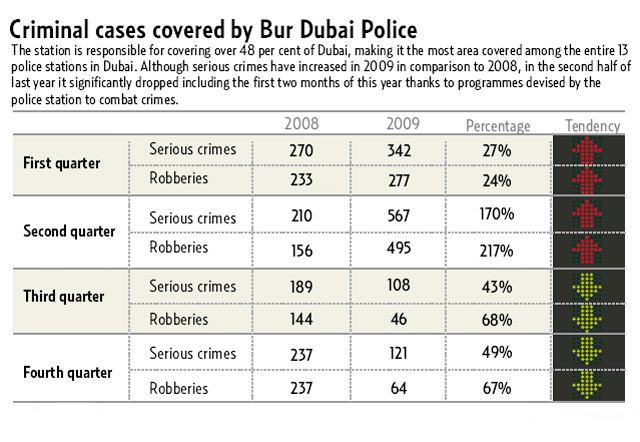
Dubai: Bur Dubai witnessed an increase of 25 per cent in serious crimes in 2009 compared to 2008. They were recorded mostly during the first half of the year.
However, the figures decreased significantly in the second half of the year after the Bur Dubai police station initiated programmes to combat them.
The Bur Dubai police station is responsible for overseeing 48 per cent of Dubai, making it the police station with the largest area to cover from among the 13 police stations in Dubai.
"It is a challenging task but with our routine and continuous research, we ensure to implement the programmes to tackle any issue. We always focus on our negative points rather than the positive ones," said Lieutenant Colonel Ali Ganem, Director of Bur Dubai police station, during a press gathering on Monday.
Since July 2009, the department implemented "the revolutionary programme" to address faults in police units, administration, customer services and field operations.
Holistic changes
Thanks to these holistic changes, robberies decreased by 43 per cent in the third quarter and by 49 per cent in the fourth quarter, which is a significant effort since it was up by 217 per cent in the second quarter and 24 per cent in the first quarter, he said.
Further decreases in serious crimes and robberies this year were witnessed as 75 were recorded in January of last year, whereas it decreased by 45.3 per cent in January of this year. And robberies decreased by 54.2 per cent this year in comparison to January of last year.
In February the figures dropped from 129 serious crimes in 2009 to 40 in 2010 while robberies declined from 102 in 2009 to 23 in 2010.
Around 3,450 units covered the entire area, and were mainly focused on Al Quoz industrial area, Al Barsha and Umm Suqeim. Another set of 450 units patrolled Jumeirah.
These calculations were based on thorough research and observation of crimes happening over the past few years, since certain crimes "are seasonal and our aim was to prevent the crime before happening".
He said: "Our studies involved taking into consideration the culture, languages and educational backgrounds of people living in certain areas. When the plan worked in one area we applied it in other areas that had similar features," he said.
Their experience is the first of its kind among police stations in Dubai and will be taken as a reference to all police stations, he said.
According to Lt Col Ganem, in 2009 they received over 15,940 complaints about bounced cheques. Of this figure, 3,700 reports were settled at the police station and public prosecution.
Meanwhile, 4,800 names of suspects involved in bounced cheques were referred to the public prosecution in the past six months. They will be tried in absentia and Interpol will follow another 400 suspects who have fled the country.
"All these suspects will be traced on charges related to bounced cheques no matter how small or big the amount is," he said.
Grace period
"Before registering a case, we provided bank clients with a grace period to amicably repay their debts and loans," he said.
Lt Col Ganem said that cheques related to real estate owners and real estate developers and brokers are referred to a special committee to issue a decision.
The police station did not witness any case of drug smuggling or usage in the detention centre since they established their "revolutionary programme" in July of 2009.
Large banners have been placed in detention units outlining the rights of the detainees at the stations and what they are prohibited from doing.
The police station has also set a ceiling on money prisoners are allowed to collect from visitors per week, which should not exceed Dh500 per week. Visits to drug addicts are restricted to close family members only.


